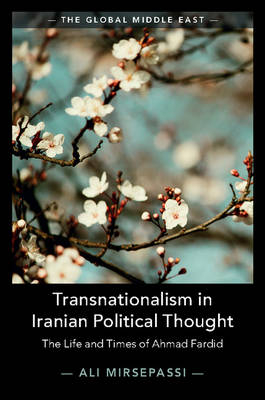
Transnationalism in Iranian Political Thought
Cambridge University Press (Verlag)
978-1-316-63647-3 (ISBN)
During the Iranian Revolution of 1978/9, the influence of public intellectuals was widespread. Many espoused a vision of Iran freed from the influences of 'Westtoxification', inspired by Heideggerian concepts of anti-Western nativism. By following the intellectual journey of the Iranian philosopher Ahmad Fardid, Ali Mirsepassi offers in this book an account of the rise of political Islam in modern Iran. Through his controversial persona and numerous public and private appearances before, during and particularly after the Revolution, Fardid popularised an Islamist vision militantly hostile to the modern world that remains a fundamental part of the political philosophy of the Islamic Republic to this day. By also bringing elements of Fardid's post-revolutionary thought, as well as a critical analysis of Foucault's writings on 'the politics of spirituality', Mirsepassi offers an essential read for all those studying the evolution of political thought and philosophy in modern Iran and beyond.
Ali Mirsepassi is Professor of Middle Eastern and Islamic Studies at New York University, where he is also the Director of Iranian Studies Initiative. He is the co-author, with Tadd Fernee, of Islam, Democracy and Cosmopolitanism: At Home and in the World (Cambridge, 2014), and the author of Political Islam, Iran and Enlightenment: Philosophies of Hope and Despair (Cambridge, 2011), Democracy in Modern Iran (2010) and Intellectual Discourses and the Politics of Modernization: Negotiating Modernity in Iran (2000).
Part I. Introduction: Introduction. Islam after fall: why Fardid matters; 1. The historical context: the intellectual's modern calling; 2. 'Home' and the 'world': 'the swallows return to their nest'; Part II. The World of Young Fardid: 3. Young Fardid (1935–46); 4. Henry Corbin's 'imaginative spirituality' and Iranian 'Gharbzadegi' (Westoxication); Part III. Orientatlism and 'Spiritual Islam': Fardid, Corbin, Foucault: 5. Gharbzadegi (Westoxication); 6. The politics of spirituality: Foucault, the Iranian Revolution; Part IV. Ahmad Fardid's Philosophy after the Revolution, 1978–81: 7. The divine encounter and apocalyptic revelations; 8. A reckless mind: policies of Gharbzadegi; Part V. Fardid Remembered: 9. Interviews with Fardid's friends and critics; Conclusion. Fardid after Fardid.
| Erscheinungsdatum | 28.02.2017 |
|---|---|
| Reihe/Serie | The Global Middle East |
| Zusatzinfo | Worked examples or Exercises |
| Verlagsort | Cambridge |
| Sprache | englisch |
| Maße | 150 x 228 mm |
| Gewicht | 650 g |
| Themenwelt | Geisteswissenschaften ► Archäologie |
| Geschichte ► Allgemeine Geschichte ► Neuzeit (bis 1918) | |
| Geschichte ► Allgemeine Geschichte ► Zeitgeschichte | |
| Geisteswissenschaften ► Geschichte ► Regional- / Ländergeschichte | |
| Geisteswissenschaften ► Philosophie ► Östliche Philosophie | |
| Geisteswissenschaften ► Religion / Theologie ► Islam | |
| ISBN-10 | 1-316-63647-X / 131663647X |
| ISBN-13 | 978-1-316-63647-3 / 9781316636473 |
| Zustand | Neuware |
| Haben Sie eine Frage zum Produkt? |
aus dem Bereich


